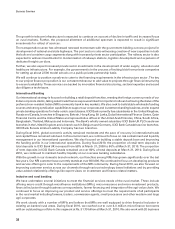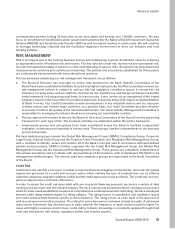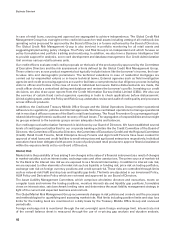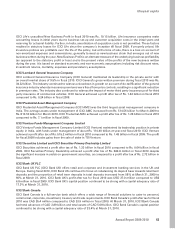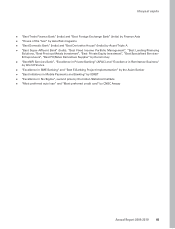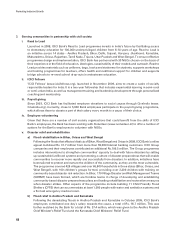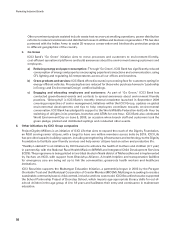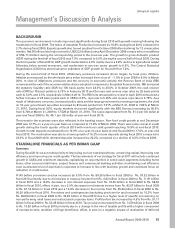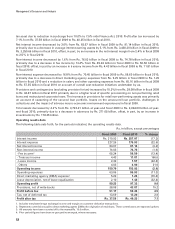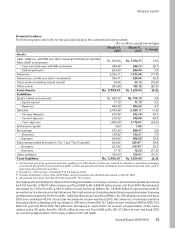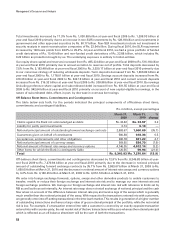ICICI Bank 2010 Annual Report Download - page 50
Download and view the complete annual report
Please find page 50 of the 2010 ICICI Bank annual report below. You can navigate through the pages in the report by either clicking on the pages listed below, or by using the keyword search tool below to find specific information within the annual report.Promoting Inclusive Growth
3. Serving communities in partnership with civil society
i. Read to Lead
Launched in 2008, ICICI Bank’s Read to Lead programme invests in India’s future by facilitating access
to elementary education for 100,000 underprivileged children from 6-14 years of age. Read to Lead is
an initiative across 14 states - Andhra Pradesh, Bihar, Delhi, Gujarat, Haryana, Jharkhand, Karnataka,
Maharashtra, Orissa, Rajasthan, Tamil Nadu, Tripura, Uttar Pradesh and West Bengal. To ensure effective
programme design and implementation, ICICI Bank has partnered with 30 NGOs chosen on the basis of
their experience in the field of education, ideologies, sustainability of their models and outreach. Read to
Lead provides materials such as uniforms, bags, books and stationery for students, supports workshops
and training programmes for teachers, offers health and nutritional support for children and supports
bridge schools to re-enrol school drop-outs in mainstream education.
ii. ICICI Fellows
‘ICICI Fellows’ (www.icicifellows.org), launched in November 2009, aims to create a cadre of socially
responsible leaders for India. It is a two-year fellowship that includes experiential learning in semi-rural
or semi-urban India, as well as management training and leadership development through personalised
coaching and mentorship.
iii. Payroll giving
Since 2003, ICICI Bank has facilitated employee donations to social causes through GiveIndia (www.
Giveindia.org). Currently, close to 5,000 Bank employees participate in the payroll-giving programme,
which allows them to donate a part of their salary every month to a cause of their choice.
iv. Employee volunteering
Given that there are a number of civil society organisations that could benefit from the skills of ICICI
Bank’s employees, the Bank has been working with iVolunteer (www.ivolunteer.in) to offer a number of
options for the Bank’s employees to volunteer with NGOs.
v. Disaster relief and rehabilitation
a) Flood rehabilitation in Bihar, Orissa and West Bengal
Following the floods that affected districts of Bihar, West Bengal and Orissa in 2008, ICICI Bank’s online
appeal mobilised Rs. 31.7 million from more than 55,000 Internet banking customers. ICICI Group
companies and their employees contributed an additional Rs.106.5 million. The Group programme
includes interventions to strengthen communities’ capacity to deal with future disasters by setting
up sustainable livelihood systems and promoting a culture of disaster preparedness that will enable
communities to recover more rapidly and successfully from disasters. In addition, initiatives have
been tailored to protect and nurture the children of the community, as they are the most vulnerable.
The programme covered 425 villages and over 66,500 households in three states (Bihar, Orissa, and
West Bengal), with 160 children’s groups formed, providing over 3,200 children with training on
community-based disaster risk reduction. In Bihar, 170 Village Disaster and Risk Management Teams
(VDRMT) have been formed, which are frontline teams in charge of developing and establishing
community-based disaster preparedness plans and leading rehabilitation and restoration measures
when disaster strikes. Other aspects of the programme include building 11 Child Friendly Flood
Shelters (CFFS) that can accommodate at least 1,000 people with water and sanitation systems and
a first aid emergency medical room.
b) Flood relief in Andhra Pradesh and Karnataka
Following the devastating floods in Andhra Pradesh and Karnataka in October 2009, ICICI Bank’s
employees contributed one day’s salary towards the cause, a total of Rs. 18.7 million. This was
further matched by the Bank for a total of Rs. 37.4 million, which was given to the Andhra Pradesh
Chief Minister’s Relief Fund and the Karnataka Chief Ministers’ Relief Fund.
48


